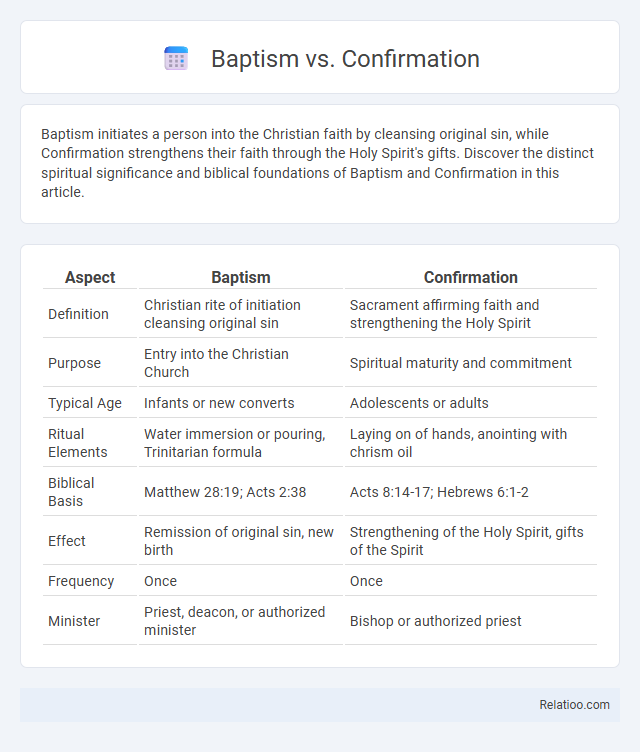Baptism initiates a person into the Christian faith by cleansing original sin, while Confirmation strengthens their faith through the Holy Spirit's gifts. Discover the distinct spiritual significance and biblical foundations of Baptism and Confirmation in this article.
Table of Comparison
| Aspect | Baptism | Confirmation |
|---|---|---|
| Definition | Christian rite of initiation cleansing original sin | Sacrament affirming faith and strengthening the Holy Spirit |
| Purpose | Entry into the Christian Church | Spiritual maturity and commitment |
| Typical Age | Infants or new converts | Adolescents or adults |
| Ritual Elements | Water immersion or pouring, Trinitarian formula | Laying on of hands, anointing with chrism oil |
| Biblical Basis | Matthew 28:19; Acts 2:38 | Acts 8:14-17; Hebrews 6:1-2 |
| Effect | Remission of original sin, new birth | Strengthening of the Holy Spirit, gifts of the Spirit |
| Frequency | Once | Once |
| Minister | Priest, deacon, or authorized minister | Bishop or authorized priest |
Understanding Baptism: Meaning and Significance
Baptism represents a sacred initiation into the Christian faith, symbolizing purification and rebirth through water and the Holy Spirit. Confirmation deepens this commitment by strengthening Your spiritual gifts and affirming Your personal faith journey. Symbolism in both rites highlights profound spiritual truths, with baptism emphasizing cleansing and new life, and confirmation expressing empowerment and maturity in faith.
What Is Confirmation? An Overview
Confirmation is a Christian sacrament that strengthens and deepens the grace received at Baptism, often marking the recipient's full membership in the Church. It involves the anointing with chrism oil and the laying on of hands by a bishop or priest, symbolizing the Holy Spirit's empowerment. Your understanding of Confirmation highlights its role in affirming faith and commitment, distinct from Baptism's initiation and the broader use of symbolism in religious practices.
Historical Origins of Baptism and Confirmation
Baptism originated in early Christian communities as a ritual of purification and initiation, symbolizing the cleansing of sin and rebirth in Christ, with roots tracing back to Jewish purification rites. Confirmation developed later as a distinct sacrament, emphasizing the strengthening of faith and the reception of the Holy Spirit, often associated with the laying on of hands by bishops. Understanding these historical origins helps you appreciate the rich symbolism each sacrament holds within Christian tradition.
Key Differences Between Baptism and Confirmation
Baptism initiates your spiritual journey by cleansing original sin and officially welcoming you into the Christian community, while Confirmation strengthens your faith by bestowing the Holy Spirit and affirming your commitment. Baptism typically involves water as a symbol of purification, whereas Confirmation uses the anointing with oil to signify spiritual maturity and empowerment. These sacraments serve distinct but complementary roles in your faith, marking both the beginning and deepening of your relationship with God.
The Role of Baptism in Christian Faith
Baptism plays a foundational role in the Christian faith as the sacrament of initiation, signifying the cleansing of sin and the believer's entry into the body of Christ. Unlike Confirmation, which strengthens and deepens one's faith, Baptism symbolizes spiritual rebirth and commitment to a new life aligned with God's will. Your understanding of Baptism is essential to grasp the profound theological meaning behind this sacred ritual and its ongoing impact on Christian identity.
The Purpose and Importance of Confirmation
Confirmation strengthens your spiritual journey by deepening your commitment to the Church and affirming your faith, building upon the foundation established at Baptism. This sacrament imparts the gifts of the Holy Spirit, empowering you to live a mature Christian life and participate fully in the Church's mission. The symbolism involved in Confirmation--such as anointing with chrism--signifies sealing with the Holy Spirit, distinct from Baptism's initiation, highlighting its unique purpose in spiritual growth and empowerment.
Baptism and Confirmation in Catholicism
Baptism in Catholicism signifies the cleansing of original sin and entry into the Christian community, marking the beginning of Your faith journey. Confirmation strengthens the grace received at Baptism through the Holy Spirit, empowering You to live a mature Christian life and witness to Your beliefs. Both sacraments carry profound symbolism, with Baptism representing spiritual rebirth and Confirmation symbolizing the sealing of the Holy Spirit's gifts.
Baptism vs Confirmation Across Christian Denominations
Baptism and Confirmation represent distinct sacraments across Christian denominations, with Baptism generally serving as the initiation rite signifying spiritual cleansing and entry into the faith community, often performed shortly after birth or upon conversion. Confirmation usually follows Baptism and involves a conscious affirmation of faith, symbolizing the strengthening of the Holy Spirit and full membership in the church, a practice particularly emphasized in Catholic, Orthodox, and some Protestant traditions. Understanding the theological and ritual differences between Baptism and Confirmation can enhance Your appreciation for how various Christian communities express and deepen their spiritual commitments.
Age and Timing: When Are Baptism and Confirmation Performed?
Baptism is typically performed during infancy or early childhood to initiate individuals into the Christian faith, symbolizing spiritual cleansing and rebirth. Confirmation usually occurs later, often during adolescence or adulthood, marking a conscious affirmation of faith and the strengthening of the Holy Spirit. The timing emphasizes baptism as an entry rite, while confirmation serves as a personal commitment to Christian beliefs.
Spiritual Impact: Baptism Compared to Confirmation
Baptism initiates your spiritual journey by cleansing original sin and symbolizing rebirth into the Christian faith, marking a foundational transformation. Confirmation deepens this commitment by imparting the Holy Spirit, empowering you to live out your faith with strengthened resolve and spiritual gifts. The symbolism of both sacraments underscores distinct spiritual impacts: baptism represents a new beginning, while confirmation signifies maturation and full integration into the faith community.

Infographic: Baptism vs Confirmation
 relatioo.com
relatioo.com